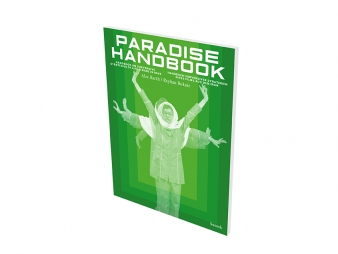* All prices inc. VAT, plus shipping costs
Paradise Handbook
Handbook on Subversive Strategies of a Film Made in Iran
Alec Barth / Reyhan Bokaie
edited by Andreas Baur
texts (German/English) by Alec Barth and Reyhan Bokaie, essay by Ebrahim Beygi, statements by Sina Ataeian and Yousef Panahai, interviews with Dorna Dibaj, Martin Steyer, Lajos Wienkamp
176 p with 110 coloured illustrations
270 x 205 mm, softcover
ISBN 978-3-86442-248-5
Dancing forbidden!
PARADISE HANDBOOK reveals a concise insight into the genesis of the film »Paradise«, which director Sina Ataeian Dena managed to realize in Iran over a period of many years without filming permission and on a very small budget. The resulting footage was eventually brought out of the country and processed and finished in Berlin-Babelsberg. »Paradise« celebrated its premiere in 2015 in competition at Locarno Film Festival and was subsequently awarded various prizes. The book reveals a fascinating view of how the film crew dealt creatively with the massive restrictions on filming in Iran. It breaks down, like a manual, the logistical, strategic, and technical efforts underlying the images and scenes in »Paradise« that the team applied to circumvent the plethora of restrictions. Created as a documentary feature film, »Paradise« presents the viewer with seemingly mundane scenes of life. However, to create the impression of a realistic representation of everyday life meant that very complicated precautions had to be taken. Iranian censorship, especially of feature films, scrupulously regulates everything that could somehow be understood as critique, such as the (absolutely necessary) concealment of female characters; and to show adolescent girls dancing to pop music in a school bus or during school breaks, is completely unimaginable.
Exhibition:
Hidden / Secret – Strategien des Verborgenen
Villa Merkel Galerien der Stadt Esslingen am Neckar, 25/3–3/6/2018
































